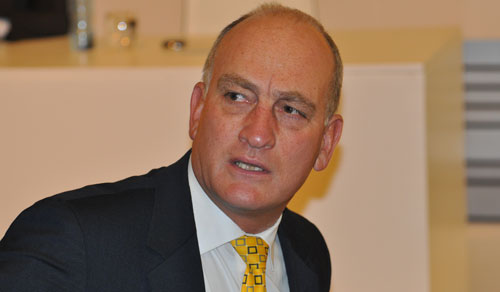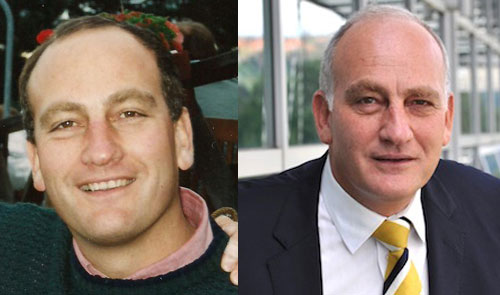
MTN SA MD Karel Pienaar is a smiling but imposing figure whose name commands respect in the halls of the company’s gleaming 14th Avenue head office in Fairlands, Johannesburg. Impossible as it sounds, having been part of MTN’s bid for a licence in SA, technically the 53-year-old Pienaar has been with the operator since before it even started, and it looks like he’ll be with the company for some time to come.
Prior to MTN, Pienaar was business development manager at pay-TV operator MultiChoice. He says it was while he was there, around 1990, that he identified cellular as an opportunity. In 1994, he and his team secured a licence for SA’s second mobile operator and it’s been a wild ride ever since.
“I still have the first business model for MTN on ‘stiffies’ somewhere, probably about 20 of them,” Pienaar says. He’s “always been a telecoms person”, having once been a young engineer at Telkom. Pienaar was also part of the Diginet project — Telkom’s leased-line service — during its early days.
He went on to work for a wide range of companies in the industry. “I was involved in data communications when it was still offering only 75 bits per second,” he says. “I was also involved in installing the first teletext machine, a T39, in SA in the 1980s. We’ve come a long way from that now; from 75 bits per second to 60Mbit/s in 28 years.”
There’s no doubt Pienaar has a fondness for new business ventures. He had the chance to select the team that bid for SA’s second GSM licence and was involved in selecting MTN’s early shareholders. He was instrumental in selecting an overseas operator – Cable & Wireless – to help the bid team.
The team won the bid and Pienaar became MTN SA’s chief technology officer at launch. He says the company had expected a few hundred thousand customers in the first year, but its expectations were outstripped by the falling cost of cellphones. “We never thought handset prices would drop so fast,” he says.
Pienaar says SA had a pilot GSM system in place as early as 1991, which was used to lobby government. “We wanted to show them there was more than Telkom thought could be done with cellular.”
At first, MTN SA behaved like the start-up it was, but by 1994 it had started looking at expanding into other African markets, despite pressure from shareholders to focus exclusively on SA. The decision to expand abroad proved fortuitous: MTN is now much bigger than rival Vodacom, which was licensed at around the same time.

“We always knew the market would become saturated here and we would need other markets,” he says. Two years after the genocide in Rwanda, MTN entered the central African nation with a “drop-and-deploy” network of containers. Shortly thereafter, it launched a network in Uganda.
When MTN entered Nigeria, now the group’s most successful market, Pienaar took on the role of MD and would go on to visit and often work in cities across the continent over a period of years. He met presidents, like Nigeria’s Olusegun Obasanjo, and gained a deep understanding of African business and politics.
After his stint in Nigeria, Pienaar was appointed as chief technology information officer for MTN Group, and as it expanded under the leadership of former group CEO Phuthuma Nhleko into 21 territories across Africa and the Middle East, he found himself “spending many days on planes”.
“For a while we used to keep track of air miles and I was the second or third most travelled MTN executive. It’s quite a life. I love Africa and I love the development aspect.”
When MTN first entered Nigeria, that market had 30 000 fixed lines and nothing else. “Ten years later, we have about 40m customers. It’s phenomenal to get that kind of penetration, and to make that kind of difference. I feel privileged to be part of an industry that makes a difference to society and to people’s lives. At the same time it allows you to make money for your shareholders, and for your own family.”
After years of incessant travel, Pienaar was asked to return to the SA business, which wasn’t performing to expectations. Though he says he doesn’t miss the travel, he does miss the diverse range of people he met along the way.
Even after 17 years in business, he feels MTN’s story is “still just beginning”. Never before has he seen such a fast transition with the rise of smartphones and tablets, cheaper data, the growth in applications and demand for them, and the changing way businesses are operating.
There’s little doubt that Pienaar genuinely loves the industry. “I feel sad for people who are in jobs they don’t love. I work because I love what I do and not because I need to anymore.”
A self-confessed workaholic, he thinks of his position as “24-hour job”, but nevertheless has plenty of hobbies. The most recent of these is kite surfing, though he claims he isn’t very good at it yet. He’s also an avid golfer and mountain biker and plans to ride the upcoming Tour de Tuli, a week-long event that starts in Botswana.
He’s also partial to watersports, enjoys fishing and recently took a liking to tiger fishing. He also enjoys hunting, mainly birds rather than large game.
“You’ll find me on a farm many weekends in hunting season with my shotgun and dogs.”
As if the list wasn’t long enough, Pienaar is also an advanced scuba diver.
The question is how he finds the time. “You can make the time. You have to.”
It probably helps that he only sleeps four or five hours a night.
With his children studying abroad, Pienaar says he has more time for his hobbies now, but that “one of the sadnesses of work is that you can only do so many other things; there isn’t much spare time.”
For Pienaar, however, the job has always come first, with the hobbies a distant second. “Even my family has been secondary to an extent, but they’ve always accepted that.”
Despite having been with MTN for 17 years, Pienaar says he’s stayed because he’s moved around within the company every year or two, which has kept him stimulated. “I’ve seen MTN grow from nothing to a company with a R270bn market capitalisation and I’ve grown with it,” he says. “We never thought it would get this big. I said I wanted it to get bigger than Telkom, but didn’t think it would happen.”
He says it’s been equally hard thinking about where the technology would go. Pienaar is using MTN’s long-term evolution (LTE) connectivity for things like Internet Protocol TV at his house, something he says he would never have imagined.
“That’s what keeps me awake the most: how we’re going to get the spectrum to make SA the leading ICT country in Africa.”
Pienaar says he hopes to see spectrum “correctly allocated” with all stakeholders catered for in a reasonably balanced way. “I think the new [communications] minister [Dina Pule] will be good for making things happen, but you can never satisfy everyone.”
Whatever happens with spectrum, Pienaar will be there, lobbying and pushing MTN to take full advantage of it. He says he can’t wait to see what the industry will become once it’s allocated. — Craig Wilson, TechCentral
- Subscribe to our free daily newsletter
- Follow us on Twitter or on Google+ or on Facebook
- Visit our sister website, SportsCentral (still in beta)




